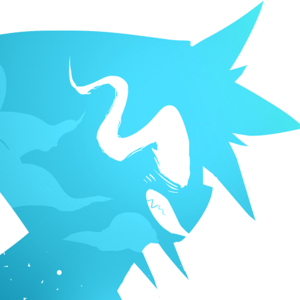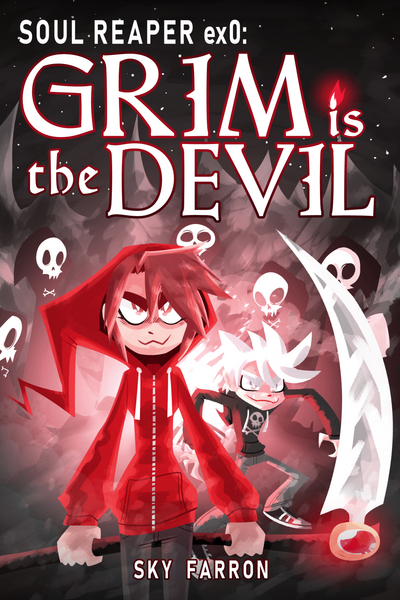RED HOOD & THE WOLF
Once upon a time, there was a boy in a black skull-n-bones hoodie
named Raimundo Radigan. He lived in the wonderful city of New Prezzo, in
the province of British Alberta. It was clean, mild, and had kind folks
on every block. Forests surrounded the city on every side. Every
building was on the solar grid, thanks to panels and paints and other
innovations. Then there was the wind, and the water, and more, to keep
gears turning no matter what surges or faults could befall them. And
people used very little indeed, except to work; to keep homes warm and
lit; to keep schools bright; and to entertain themselves, when work and
school were over. The world was built on a thriving international
marketplace, where produce and other goods could be traded in trust,
with allies from across the oceans. Each rooftop hosted gardens, and
people grew whatever spare food they needed right there at home. Not a
single citizen entertained the notion of devouring an animal's flesh,
for it had long since been found barbaric, and it encouraged murditis of
all kinds. Nor did they allow the poisons of sugar, glutenous wheat,
boiling deep-oils, heavy pesticides, or any fungus into their
supplies... for it would threaten their businesses. The customers would
protest, for they were informed, and no longer wished to be poisoned. A
long time ago, the world had been threatened by climate annihilation,
fed into by sickly people, of devastating mental and physical illnesses,
most of all sheer greed. But disaster had been averted, at the
very last moment. The original Earth was preserved, and reinvigorated by
liberty and environmental concern.
The people were equally
progressive, many of them having organized to ensure that this
prosperity would remain as long as it could. They gathered in halls, and
collaborated online, to discuss and rehash whatever was most important
that day. It was a time of political understanding, where even the most
uninformed citizen could be brought back up to speed, with reliable
truth. There was no more war, except for defense. Though in some distant
nations, poverty was amuck, this was not the case at home... and so it
seemed, at least to the people of United Canadia, that the world was at
peace. It was only a few stragglers, anyhow, who didn't seem to notice.
Most of the citizens there were quite wealthy, and of skyscraper
professions. There were students at school, training to become a part of
the National Intercontinental Defense Corps, or NIDC (said 'niddick').
They employed the use of mech suits, so efficient and lightweight, that
their pilots often said that controlling them was like 'wearing a second
self'. They fought horrors and injustice on the backside of the world,
where evil still stained... but only because good had not yet been
allowed to cleanse it. Because they lived in a time of truth, such a
claim could actually be believed, for once. They truly were, for the
first time in history that anybody could recall, the 'Good Guys'. Free
of corruption, hearts full of hope and valor. It made one proud to know
such a soldier, and indeed, to even be such a citizen.
The other
students were not cadets, but were instead star athletes, or
mathematical prodigies. Lingual experts, masters of debate, and career
centurions – that being, of course, someone who always has to have one
hundred percent, on every single test, pop quiz, and exam. Raimundo was
none of these. He was merely the loner in the back, scribbling darkness
and strife into his notebook. Images of people punching each other, or
being rained upon with fire, from the sky; skeletons ripping themselves
from their fleshy carriages, dancing about on their own graves; monsters
of human faces, which hung loosely from their jaws, as if to beg
whether they were even trying to wear them, or simply happened to be
caught eating them in a precocious state. Compared to the other
students, Raimundo was only lucky to be there at all. They were
professional, and forward-thinking; he was just a child, with funny
ideas about fighting, darkness, and struggle. These thoughts of his
embarrassed him, and made of him a very sore thumb. He was given
reprimand, and stern warnings, and told:
"What you yearn for is a
violence to which we cannot return. The world does not belong there, in
that muck, for any longer. We must never again fight for what is
right... for it is the fighting itself that is wrong. If we cannot win
by politics, and by reason, then we are not worth victory at all. If
peace cannot be deserved, it will be shattered. This is what you seek to
do, so mind yourself, young child. Stand back in line, sit back in your
row. And do what you are told... it is for the good of everyone."
Ray was not like the mech-pilots, whose legendary tempers were forged
steel under tense combat. Whose anger was as cold as ice. Ray was just a
dumb child, he was told, whose bare mind's touch threatened fire, and
storms. After being told what to do for long enough, Ray became angry.
His anger made him resentful, because he could not express it. His
resent made him think terrible things, so he became ashamed. His shame
made him anxious, and thus, he began to shy away from the world which he
was taught, from a very young age, that he stood only to threaten with
his misbehavior. He became so shy, over time, that he couldn't stand to
go anywhere without covering his head. And now, it was as if he'd never
existed at all. What he was, and what he did, was only his to know...
even if it was as dangerous as fire. So on he went, fuming smoke.
What Ray wanted more than anything was a friend. He'd had a fleeting
few, but never for long. They'd always had too many questions.
"What do you like to do? What are your favourite foods? What's your favourite color? What do you like to watch, on TV?"
He had no answer for them, because he'd been told not to say. So as far
as anyone else knew, he had no idea what his favourite things were.
Everything was good, all was well. There was no need to have a favourite
anything. They were all serviceable. Ray kept to the back of every
class, and spoke to nobody. He dressed in near-black because it made him
harder to see, among the crowd. A pitch black would stand out,
ironically, for its uncanny darkness. It was the darkest grey that made
him a shadow, among a sea of brighter tones and hues. In time, Raimundo
disappeared entirely from their world, like a ghost. Only the black hood
remained. Nobody knew his name, and nobody he told.











Comments (0)
See all